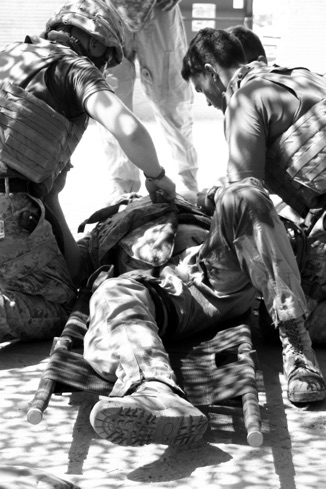It was like my fate had been spoken: I had never been blown up before, but everyone in the Humvee knew that was about to change.
According to the laws of grunt superstition, I was the injured party, but somehow I managed to feel bad for the kid who’d asked the question. As it happened, the soldiers in the Humvee were from all over Latin America—Peru, Mexico, Guatemala—and they began pummeling him in a variety of languages and accents for what he’d done.
At the time, I felt embarrassed more than anything else and just wanted the moment to end. I didn’t like being the topic of conversation, and it took everything I had to avoid thinking about being blown into tiny red pieces. This, in fact, was one of the first head tricks I’d learned in Iraq, to systematically ignore the obvious: you were always just about to die—get over it. I was wasted, too, and my mind wasn’t right. I had been in Iraq for a total of nine months by this point, and even though I had seen people killed by roadside bombs, I’d never been hit myself, and somehow I’d come to feel that I had my luck under control. But in posing the question, it was as if the soldier had stolen that control, thrown me over to the forces of chance that I had worked so hard to insulate myself from.
Later, I interviewed a prominent psychoanalyst, who told me that trauma destroys the fabric of time. In normal time, you move from one moment to the next, sunrise to sunset, birth to death. After trauma, you may move in circles, find yourself being sucked backwards into an eddy, or bouncing about like a rubber ball from now to then and back again. August is June, June is December. What time is it? Guess again. In the traumatic universe, the basic laws of matter are suspended: ceiling fans can be helicopters, car exhaust can be mustard gas.
Another odd feature of traumatic time is that it doesn’t just destroy the flow of the present into the future, it corrodes everything that came before, eating at moments and people from your previous life, until you can’t remember why any of them mattered.
What I previously found inconceivable is now inescapable: I have been blown up so many times in my mind that it is impossible to imagine a version of myself that has not been blown up. The man on the other side of the soldier’s question is not me. In fact, he never existed.
The war is gone now, but the event remains, the happening that nearly erased the life to come and thus erased the life that came before. The soldier’s question hangs in the air the way it always has. The way it always will.
Have you ever been blown up before, sir?




